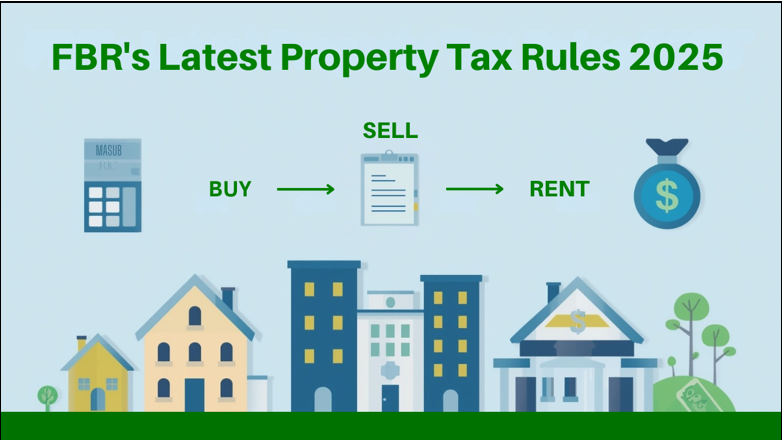The real estate sector in Pakistan remains one of the most attractive investment opportunities, but new tax rules introduced by the Federal Board of Revenue (FBR) in the Finance Act 2024 and Finance Act 2025 have changed how buyers, sellers, and landlords should plan their property investments.
Whether you are selling a plot, purchasing a house, or renting out apartments, these new rules directly affect your profits, compliance requirements, and tax obligations. In this article, we’ll break down the latest FBR tax rules for property investors in Pakistan in simple terms.
Why Property Investors Must Pay Attention to FBR Rules
In Pakistan, property is not just about buying and selling—it’s also about navigating taxation policies that can either safeguard or erode your profits. Knowing the capital gains tax rates, rental income slabs, advance tax requirements, and compliance rules helps you:
- Avoid penalties and legal complications
- Stay competitive in the property market
- Plan better cash flows and returns on investment
- Protect long-term wealth
Key Updates and Rules for Property Investors
1. Capital Gains Tax (CGT) on Disposal of Property
- From July 1, 2024, the holding period-based tax relief has been abolished for properties acquired after that date.
- A flat 15% CGT now applies to sales made by filers on the Active Taxpayer List (ATL).
- Non-filers or non-ATL sellers face higher progressive tax rates, with a minimum of 15%.
👉 Investor Impact: The strategy of holding property long-term to reduce tax liability no longer works. Being an ATL filer is now crucial to secure lower tax rates.
2. Advance Tax on Property Transactions
- According to the Finance Act 2025:
- On sale/transfer of property (Section 236C): Advance tax rates have increased.
- On purchase of property (Section 236K): Advance tax rates have been reduced.
👉 Investor Impact: Sellers face a heavier tax burden upfront, while buyers enjoy some relief. Budgeting for advance tax is essential before finalizing deals.
3. Declaration of Fair Market Value (FMV)
- Effective July 1, 2025, investors must declare the Fair Market Value (FMV) of property in their tax returns.
👉 Investor Impact: This move promotes transparency and discourages undervaluation of property. Proper documentation, valuation certificates, and bank transaction records are a must to avoid disputes or penalties.
4. Rental Income Taxation
- Rental income remains taxable under the Income Tax Ordinance.
- Income up to ₨ 600,000 annually is exempt.
- Above ₨ 600,000, progressive tax rates apply.
👉 Investor Impact: Filers benefit by paying lower taxes. Landlords should maintain lease agreements, receipts, and expense records to maximize deductions and stay compliant.
5. Set-off of Losses
- Under Circular No. 1 of 2025-26, business losses can no longer be offset against property income.
👉 Investor Impact: Even if you incur losses in your business (e.g., construction), you cannot use them to reduce your taxable property income. Each income stream is taxed separately.
6. Transactions, Eligibility, and Certificates
- For property deals above ₨ 100 million, an Eligibility Certificate from FBR may be required.
👉 Investor Impact: Large-scale property transactions will face stricter compliance and documentation requirements. Investors should prepare for potential delays and additional costs.
Quick Tips for Property Investors in 2025
✔ Stay on the Active Taxpayer List (ATL) to enjoy lower tax rates
✔ Keep proper sale deeds, valuation reports, and rental contracts
✔ Budget for advance tax obligations before buying or selling
✔ Avoid informal or undervalued property transactions
✔ Plan large transactions well in advance to manage compliance requirements
Conclusion
The latest FBR tax rules mark a significant shift in Pakistan’s property investment landscape. With the removal of holding-period benefits, stricter FMV declarations, higher seller taxes, and new compliance requirements for high-value transactions, investors must be more careful than ever.
Success in real estate is not just about choosing the right property—it’s also about smart tax planning, staying compliant, and maintaining transparency. By understanding and adapting to these updates, investors can continue to build wealth in Pakistan’s dynamic property market.




